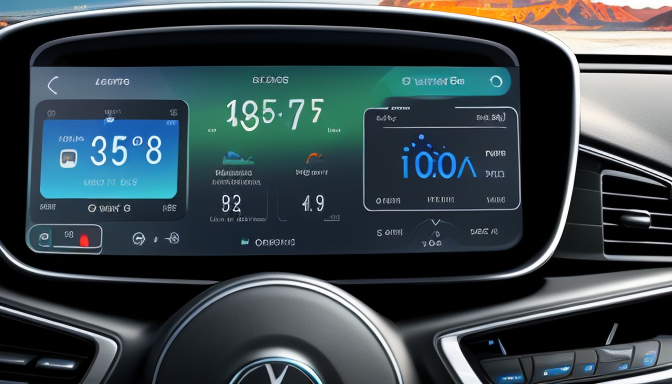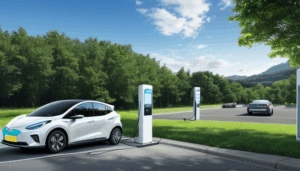Battery life is a crucial factor for electric vehicle (EV) owners, shaping not just the vehicle’s performance but also the overall driving experience. Imagine heading out on a road trip, only to find your battery running low—what a nightmare! This is why understanding battery life is essential. It impacts everything from driving range to the cost of ownership. With a good battery, you can drive further, enjoy better acceleration, and reduce the frequency of charging stops. So, how do you ensure your battery stays healthy? It involves knowing the technology behind it, recognizing factors that affect its lifespan, and keeping an eye on future trends in battery development.
Understanding Battery Technology
When it comes to electric vehicles (EVs), battery technology is the heart that keeps everything running smoothly. The most commonly used batteries today are lithium-ion batteries, renowned for their high energy density and long lifespan. But did you know there are also emerging options like solid-state batteries? These next-gen batteries promise even greater efficiency and safety, potentially revolutionizing the EV landscape.
Let’s break it down a bit. Lithium-ion batteries are like the reliable workhorse of the EV world. They charge quickly, last long, and have a good energy-to-weight ratio. However, they can degrade over time, especially if not treated well. On the other hand, solid-state batteries, which utilize a solid electrolyte instead of a liquid one, could offer longer life and faster charging times. Imagine a battery that can last longer and charge in the time it takes to grab a coffee!
To put it in perspective, consider this:
| Battery Type | Energy Density | Lifespan | Charging Time |
|---|---|---|---|
| Lithium-Ion | 150-250 Wh/kg | 500-1500 cycles | 1-2 hours |
| Solid-State | 300-500 Wh/kg | 2000+ cycles | 30 minutes |
Understanding these technologies is crucial for any EV owner. It not only impacts your vehicle’s performance but also your wallet. As we continue to innovate, staying informed about battery advancements will help you make the best choices for your driving needs.

Factors Affecting Battery Life
When it comes to electric vehicles (EVs), understanding the factors that affect battery life is crucial for every owner. Think of your EV’s battery as the heart of the vehicle; if it doesn’t function well, the entire system suffers. Several elements play a significant role in determining how long your battery will last and how efficiently it performs.
One of the most critical factors is temperature. Extreme heat or cold can significantly impact battery performance. For example, during hot summer days, batteries tend to overheat, leading to faster degradation. On the flip side, cold temperatures can reduce the battery’s ability to hold a charge, affecting your driving range. It’s essential to monitor these conditions and park your EV in shaded or temperature-controlled areas when possible.
Another key factor is your charging habits. Frequent fast charging can be convenient, but it may also shorten battery life over time. Ideally, you should aim for regular, slower charging sessions to maintain battery health. Additionally, consider your driving conditions; aggressive driving can drain your battery faster than a calm, steady pace. By adopting smoother driving techniques, you can help extend your battery’s lifespan.
Lastly, don’t forget about maintenance. Just like any other component of your vehicle, keeping an eye on your battery’s health can prevent costly replacements down the line. Regular check-ups can ensure that you’re getting the most out of your EV experience.
Impact on Range and Performance
Battery life is not just a number; it’s the heartbeat of your electric vehicle (EV). Imagine setting off on a road trip, only to realize your battery is running low—talk about a buzzkill! A healthy battery directly influences your EV’s driving range and overall performance. When your battery is in top shape, you can enjoy longer drives without the constant anxiety of charging stations looming ahead.
Consider this: the efficiency of your battery impacts how far you can go on a single charge. Factors like driving speed, terrain, and even weather can affect this. For instance, aggressive acceleration can drain your battery faster than a leisurely drive through the countryside. This is why understanding your battery’s health is crucial. Regular maintenance and mindful driving habits can help you maximize your range and keep your EV performing at its best.
Moreover, a well-maintained battery ensures that you experience optimal performance. Think of it as the difference between a sprinter and a casual jogger. A fully charged, healthy battery can deliver instant torque, making your EV feel zippy and responsive. In contrast, a degraded battery can lead to sluggish acceleration and reduced power, which is the last thing you want on the open road.
In summary, the impact of battery life on your EV’s range and performance is profound. By keeping an eye on your battery’s health and adopting smart driving habits, you can ensure that every journey is not just a trip, but an adventure!

Cost Implications of Battery Replacement
When it comes to owning an electric vehicle (EV), understanding the is crucial. Imagine investing in a sleek new car, only to face a hefty bill down the road for a new battery. It’s a reality that many EV owners must prepare for. Typically, the cost of replacing a battery can range from $5,000 to $15,000, depending on the make and model of the vehicle. This can be a significant financial consideration, especially when you factor in the lifespan of the battery, which averages around 8 to 15 years.
However, don’t let this discourage you! By maintaining a healthy battery through proper charging habits and driving conditions, you can extend its life and minimize replacement costs. For instance, avoiding extreme temperatures and frequent fast charging can help prolong battery longevity. Additionally, many manufacturers offer warranties that cover battery replacement for a certain period or mileage, which can alleviate some financial burden.
In the long run, while the initial investment in an EV may seem high, the overall savings on fuel and maintenance can offset these costs. Consider this: if you drive an EV for 10 years, the savings on gas alone could be substantial. Thus, understanding these costs isn’t just about immediate expenses; it’s about making an informed decision that benefits you in the long haul.
Future Trends in EV Battery Development
As we zoom into the future of electric vehicles, the spotlight is shining brightly on innovative battery technologies that promise to revolutionize the way we think about power. Imagine a world where your EV can charge in minutes rather than hours, or where batteries last significantly longer than they do today. This isn’t just a dream; it’s becoming a reality thanks to advancements in solid-state batteries and lithium-sulfur technology.
Solid-state batteries, for instance, use a solid electrolyte instead of a liquid one, which can enhance safety and increase energy density. This means your EV could potentially travel further on a single charge. Furthermore, researchers are exploring recycling methods that can reclaim valuable materials from old batteries, making the entire lifecycle of EV batteries more sustainable.
Additionally, fast-charging technologies are being developed that could allow drivers to recharge their vehicles in just a few minutes. With these advancements, the future of EVs is not only about sustainability but also about convenience and performance. The road ahead is exciting, filled with possibilities that will make driving electric even more appealing.
| Technology | Benefits | Challenges |
|---|---|---|
| Solid-State Batteries | Higher energy density, improved safety | Manufacturing complexity, cost |
| Lithium-Sulfur Batteries | Lower weight, higher capacity | Cycle life issues, scalability |
With these exciting trends on the horizon, EV owners can look forward to a future where battery life is maximized, costs are minimized, and the driving experience is nothing short of extraordinary. Are you ready to embrace this electric revolution?
Frequently Asked Questions
- How does battery life affect my EV’s performance?
Battery life is crucial for your EV’s performance because it directly impacts driving range and acceleration. A healthy battery ensures you can go the distance without frequent charging stops, making your driving experience smoother and more enjoyable.
- What factors can shorten my EV battery’s lifespan?
Several factors can affect your battery’s lifespan, including extreme temperatures, frequent fast charging, and aggressive driving habits. By being mindful of these aspects, you can help extend your battery’s life and maintain optimal performance.
- What is the cost of replacing an EV battery?
Replacing an EV battery can be a significant expense, often ranging from $5,000 to $15,000, depending on the model. However, maintaining your battery through proper care can save you money in the long run by delaying the need for replacement.
- Are there any new technologies improving EV battery life?
Absolutely! Innovations like solid-state batteries and advanced lithium-ion technologies are on the horizon, promising longer life, faster charging, and improved efficiency for future electric vehicles.

